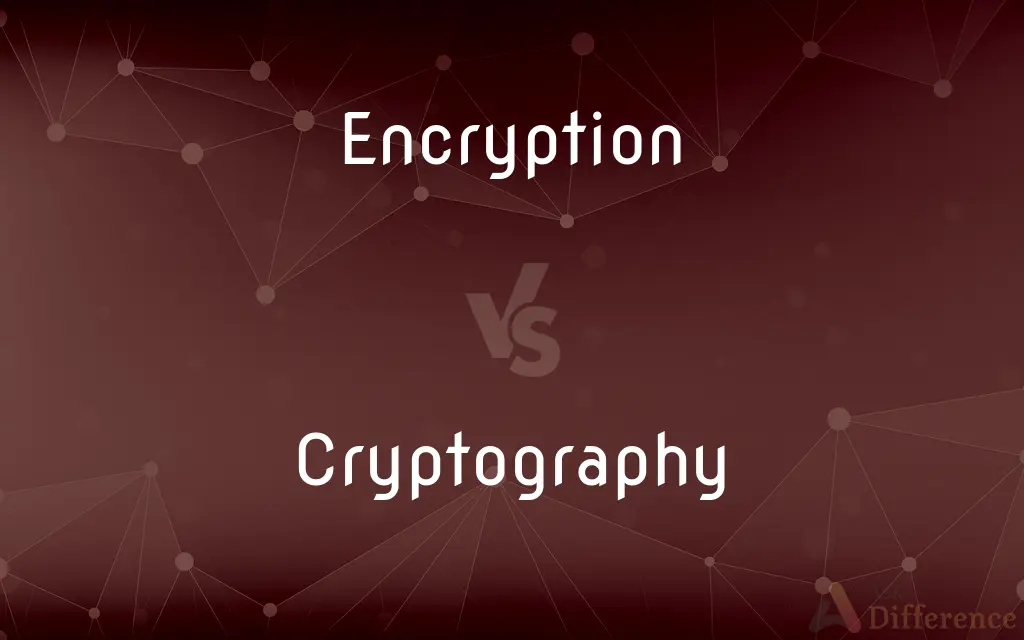Encryption vs. Cryptography — What's the Difference?
By Urooj Arif & Maham Liaqat — Updated on April 16, 2024
Encryption is a process of encoding information to protect its confidentiality, while cryptography is the broader study of techniques for secure communication.

Difference Between Encryption and Cryptography
Table of Contents
ADVERTISEMENT
Key Differences
Encryption involves transforming plain text into unreadable ciphertext using algorithms and keys, whereas cryptography encompasses the entire field, including the study of these algorithms and other security mechanisms.
Encryption aims to ensure data privacy by making information accessible only to those with decryption keys, while cryptography also includes the creation and analysis of protocols that prevent third parties from gaining unauthorized access.
Common encryption methods include symmetric and asymmetric encryption, which focus on secrecy and key distribution, respectively; cryptography, on the other hand, covers these methods and extends to digital signatures, hash functions, and more.
In encryption, the main concern is with the robustness of the encryption schemes and their resistance to various types of attacks; cryptography not only deals with encryption's effectiveness but also with the overall security of the communicating systems.
Encryption is a tool used within cryptography to achieve confidentiality. Cryptography, conversely, provides a framework and principles for designing entirely secure systems that can ensure privacy, authenticity, and integrity.
ADVERTISEMENT
Comparison Chart
Definition
Process of converting information into secure format
Science of secure communication techniques
Focus
Confidentiality of data
Confidentiality, integrity, and authenticity
Techniques Included
Symmetric and asymmetric encryption
Encryption, hashing, digital signatures
Key Concern
Secure key management and data encryption
Design and analysis of secure communication
Usage Example
Encrypting data sent over the Internet
Developing protocols for secure online banking
Compare with Definitions
Encryption
A method to secure data by converting it into a coded form.
Encryption ensures sensitive information remains confidential during transmission.
Cryptography
Includes the creation and analysis of security protocols.
Cryptography designs frameworks for secure data exchange.
Encryption
Dependent on keys for the encoding and decoding process.
Losing an encryption key can render the encrypted data irretrievable.
Cryptography
Broadly applicable in digital security and data protection.
Cryptography is fundamental in securing modern digital communications.
Encryption
Utilizes algorithms to transform plaintext into ciphertext.
Modern encryption uses advanced algorithms like AES and RSA.
Cryptography
Aims to secure data against unauthorized access and tampering.
Cryptography techniques are essential in creating secure banking systems.
Encryption
Primarily protects data confidentiality.
Encryption is crucial for securing online transactions.
Cryptography
The study of principles and techniques for secure communication.
Cryptography encompasses encryption, hashing, and digital signatures.
Encryption
Implemented in various technologies for security.
Encryption is a standard practice in securing emails and files.
Cryptography
Ensures data integrity, confidentiality, and authenticity.
Cryptography protocols validate user identities and protect data integrity.
Encryption
In cryptography, encryption is the process of encoding information. This process converts the original representation of the information, known as plaintext, into an alternative form known as ciphertext.
Cryptography
Cryptography, or cryptology (from Ancient Greek: κρυπτός, romanized: kryptós "hidden, secret"; and γράφειν graphein, "to write", or -λογία -logia, "study", respectively), is the practice and study of techniques for secure communication in the presence of adversarial behavior. More generally, cryptography is about constructing and analyzing protocols that prevent third parties or the public from reading private messages; various aspects in information security such as data confidentiality, data integrity, authentication, and non-repudiation are central to modern cryptography.
Encryption
The process or result of encrypting data.
Cryptography
(Computers) Any of various mathematical techniques for encrypting and decrypting data in order to keep it private when transmitted or stored electronically.
Encryption
Cryptography.
Cryptography
The process or skill of communicating in or deciphering secret writings or ciphers.
Encryption
(cryptography) The process of obscuring information to make it unreadable without special knowledge, key files, or passwords.
Cryptography
Secret writing.
Encryption
(cryptography) A ciphertext, a cryptogram, an encrypted value. Usually used with the preposition "of" followed by the value that is hidden in it.
Cryptography
The discipline concerned with communication security (eg, confidentiality of messages, integrity of messages, sender authentication, non-repudiation of messages, and many other related issues), regardless of the used medium such as pencil and paper or computers.
Encryption
The process of converting messages in ordinary language, or other information into a secret coded form that cannot be interpreted without knowing the secret method for interpretation, called the key.
Cryptography
The act or art of writing in code or secret characters; also, secret characters, codes or ciphers, or messages written in a secret code.
Encryption
The activity of converting from plain text into code
Cryptography
The science which studies methods for encoding messages so that they can be read only by a person who knows the secret information required for decoding, called the key; it includes cryptanalysis, the science of decoding encrypted messages without possessing the proper key, and has several other branches; see for example steganography.
Cryptography
The science of analyzing and deciphering codes and ciphers and cryptograms
Cryptography
Act of writing in code or cipher
Common Curiosities
What are common encryption techniques?
Common techniques include symmetric-key and asymmetric-key encryption.
What is encryption?
Encryption is the process of converting plain text into a scrambled format known only to authorized parties.
Can encryption exist without cryptography?
No, encryption is a subset of cryptography and relies on its principles and techniques.
How does cryptography differ from encryption?
Cryptography is a broader field that includes encryption as well as other methods like hashing and digital signatures to secure information.
Is encryption alone sufficient for security?
While encryption secures data against unauthorized access, additional measures like hashing and digital signatures are needed for complete security.
How does asymmetric encryption differ from symmetric encryption?
Asymmetric encryption uses two keys (public and private) for encryption and decryption, whereas symmetric encryption uses a single shared key.
What role does cryptography play in internet security?
Cryptography provides the necessary techniques for secure communication over the internet, including encryption, digital signatures, and secure protocols.
What are hash functions in cryptography?
Hash functions convert data into a fixed-size string of bytes, typically used for integrity checks.
What is the importance of key management in encryption?
Effective key management is crucial as the security of encrypted data depends on the secrecy and integrity of the keys.
What is the future of cryptography with the advent of quantum computing?
Quantum computing poses challenges to current cryptographic methods, necessitating the development of quantum-resistant algorithms.
What are the typical applications of cryptography in everyday life?
Cryptography is used in various applications such as secure email communication, online banking, and maintaining digital privacy.
What challenges does cryptography face today?
Challenges include quantum computing threats, ensuring user privacy while complying with legal intercept regulations, and managing complex encryption keys.
How do digital signatures contribute to cryptography?
Digital signatures ensure the authenticity and integrity of a message or document by using cryptographic techniques.
Can cryptography ensure complete security?
While cryptography significantly enhances security, no system is entirely secure against all potential attacks.
How has cryptography evolved over time?
Cryptography has evolved from simple cipher systems to complex algorithms supported by advanced mathematics and computer science.
Share Your Discovery

Previous Comparison
Me vs. Mi
Next Comparison
Lignin vs. CelluloseAuthor Spotlight
Written by
Urooj ArifUrooj is a skilled content writer at Ask Difference, known for her exceptional ability to simplify complex topics into engaging and informative content. With a passion for research and a flair for clear, concise writing, she consistently delivers articles that resonate with our diverse audience.
Co-written by
Maham Liaqat















































